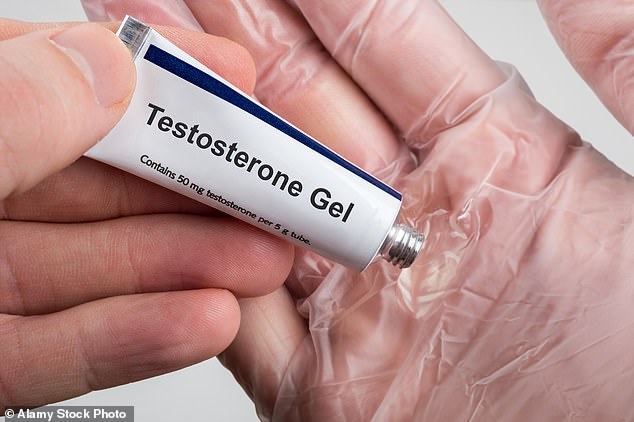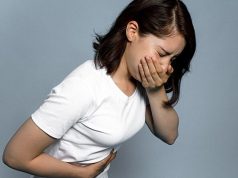When Mail columnist Bryony Gordon recently wrote about how a daily dab of testosterone gel had supercharged her flagging sex life and banished her anxiety attacks, the response from readers was overwhelming, with many women clamouring to know more.
Testosterone is mainly given to women who have gone through the menopause as a form of hormone replacement therapy (HRT).
Although most people associate HRT with patches, pills and pessaries containing combinations of progestogens and oestradiol (female sex hormones that wane with the menopause), the number of women in England being given testosterone therapy on the NHS is on the rise.

It increased ten-fold between 2015 and 2022 (from 429 to 4,675) as a treatment for low sexual desire post menopause – largely due to a demand from women themselves.
’Testosterone is called the male sex hormone, but it is actually one of the biologically active hormones in women, who produce it in their ovaries, adrenal glands and possibly brain,’ explains Vikram Talaulikar, an associate specialist in reproductive medicine University College London Hospitals NHS Foundation Trust.
’As well as having an influence on libido, it regulates bone mass, fat distribution, muscle mass and strength and the production of red blood cells.
’Levels of testosterone in women gradually decline as you enter your 30s and continue to drop around the time of the perimenopause [the lead up to the menopause] and menopause – after which they plateau, which may lead to a range of health effects including low sex drive, low mood, lack of energy and brain fog.’
Traditionally testosterone replacement therapy for women has been restricted to those who had very low libido – when other causes such as vaginal dryness, taking certain medications such as some antidepressants, or relationship issues have been ruled out, or if they’ve had surgery to remove the ovaries.
’I am not surprised that the numbers are going up rapidly because many women notice benefits from testosterone therapy, and it has relatively few side-effects when used at the recommended dosage,’ says Dr Talaulikar.
But he says despite this, testosterone therapy is being under-prescribed to women on the NHS partly because of a lack of awareness about the importance of its role in the female body – and also due to a lack of pharmaceutical products designed for women specifically.
Currently no testosterone replacement therapies are licensed for women in the UK. Doctors have to adjust doses of male products to treat women, who usually need a dose ten-times lower than a standard male dose to get benefits.
Meanwhile, some doctors are simply reluctant to give women testosterone, says Dr Talaulikar, either because they don’t believe they need it to prevent menopausal symptoms, or because the long-term effects of taking the hormone are not yet known.
Women also find it difficult to get accurate information about all forms of HRT – and many don’t realise that testosterone is produced in women’s bodies as well as men’s, says Dr Tim Hillard, a consultant gynaecologist and menopause specialist at University Hospitals Dorset.
But he adds that while there’s currently is 'a lot of noise’ around testosterone therapy, 'it definitely isn’t a cure-all for women and it’s not for everyone – some women choose to manage the menopause without medication’.
Professor Annice Mukherjee, a consultant endocrinologist and a visiting professor at Coventry University, is more emphatic – she believes the benefits of testosterone are currently being over-sold to women.
She told the Mail: 'I have seen research misrepresented to imply benefits beyond libido, which are not based on scientific evidence.’
For the right women, testosterone treatment can be 'transformational,’ she says, but warns that for many others it can have 'no more than a placebo effect, no effect – or even cause side-effects and harm.’
The current media hype has caused 'so much confusion and distress’ for women, she adds, leading some to feel they need a treatment they are being denied by their GPs, which they then have to source privately costing hundreds of pounds a year.

Mail columnist Bryony Gordon recently wrote about how a daily dab of testosterone gel had supercharged her flagging sex life
’I’ve never seen so much confusion and distress among women because they feel they can’t get hold of what they are being led to believe they need – it is so wrong,’ says Professor Mukherjee.
Use our expert guide to help you work out if you need testosterone…
HOW DO I KNOW IF I HAVE LOW TESTOSTERONE?
Testosterone influences women’s libido and sex drive and is thought to act directly on the hypothalamus (the area of the brain controlling libido).
A proportion of the testosterone a woman’s body naturally produces is also converted into oestrogen, which also boosts her sex drive, says Dr Talaulikar.
Studies show it also plays a key role in how food is metabolised, affecting body fat composition and muscle mass and bone strength in older women.
It may also promote higher levels of the 'feel-good’ brain chemical serotonin.
Symptoms of low testosterone in women can include fatigue, low energy levels, mood swings, dry skin or eyes and brain fog (although during the menopause many of these symptoms can also be caused by low oestrogen).
Reduced testosterone levels can also lead to lower levels of sexual desire and enjoyment, says Dr Talaulikar, who adds that these can be normal even in a happy relationship if you are stressed and tired – 'but total lack of interest lasting more than six months may be a sign you are suffering from hypoactive sexual desire disorder (HSDD). If so, you could benefit from medical help 'which may include testosterone replacement therapy’.
But the solution may not be to take testosterone, as in some cases low levels are linked to the HRT a woman is already taking.
Oral oestrogen tablets can cause testosterone levels to drop (by increasing levels of a protein which binds to the testosterone, stopping it working), explains Dr Talaulikar.
Simply switching from a tablet to an oestrogen patch or spray can prevent this effect, he says.
DO I NEED A BLOOD TEST?
In fact low testosterone is usually treated on the basis of symptoms, says Dr Hillard.
A blood test can’t tell you whether you need testosterone treatment because there’s no 'normal’ testosterone level and everyone responds differently, he explains.
’Many women with low testosterone levels do not complain of distressing low libido or other symptoms and should always only be prescribed based on symptoms.’
Blood tests also are not accurate enough, adds Dr Talaulikar.
’And all women are different. So someone with very low testosterone readings – below 1nmol/L, equivalent to less than one drop from a pipette – may have no problems, and someone with higher levels may have symptoms which significantly impact their quality of life.’
He explains that some guidelines recommend a blood test for testosterone before starting treatment to make sure it’s not already higher than the expected range because of an underlying problem, including diabetes or some types of cancer.
Blood tests can also provide a useful baseline once you start treatment, says Dr Hillard – and they are often taken after three months of treatment to ensure that testosterone levels don’t exceed the generally accepted upper 'safe’ limit, of around 2nmol/L.
Above this level, 'we just don’t have the evidence to show that testosterone is safe in the long term for women’, says Dr Talaulikar.
CAN I GET TESTOSTERONE ON THE NHS?
Under 2015 NICE menopause guidelines, testosterone can be considered only for postmenopausal women with low sexual desire if traditional HRT therapies haven’t been effective or if they have undergone menopause following surgery.
’The guidance does not mention or support the use of testosterone in any other circumstances,’ says Dr Talaulikar – that includes in the perimenopause or during the menopause.

Professor Annice Mukherjee believes the benefits of testosterone are currently being over-sold to women
While it’s most commonly prescribed to women aged 50 and over, the number of women under 49 receiving testosterone gel has also increased ten-fold (from 228 to 2,913) between 2015 and 2022.
Younger women who get testosterone therapy on the NHS will be postmenopausal because they’ve had their ovaries removed, or they have Turner syndrome (a genetic condition where your ovaries don’t develop), or have had chemotherapy which has caused the ovaries to stop working.
CAN I TAKE IT ON TOP OF MY 'NORMAL’ HRT?
Testosterone can be taken alongside oestrogen and progesterone – it is usually prescribed along-side oestrogen therapy, according to Dr Hillard.
’There is a lot of evidence that women after the menopause can benefit from oestrogen therapy and this is usually the first thing we try with HRT, but testosterone may be useful as a top-up therapy if low libido is still a problem.’
HOW DO I TAKE IT?
All testosterone products currently available on the NHS in the UK are formulated for hormone deficiencies in men who typically require 10mg to 50mg a day – yet a woman may only need 5mg daily to see benefits, says Dr Talaulikar.
This may involve fiddly measuring to get the right dose.
For example, while a man might be prescribed an entire 2.5g sachet a day of Testogel (a testosterone gel), a woman might only need just one-eighth of a sachet and measuring this 'can be difficult’, says Dr Hillard.
’If a woman is regularly putting on too much – she may get symptoms such as facial hair developing,’ he adds.
’For ease, some women choose to use a fine syringe to measure out their daily dose, although this can be fiddly.’
There is one form of testosterone correctly formulated for the female dose – an Australian product, Androfeme, a 1 per cent testosterone cream – available in the UK on a special licence, but only from private clinics.
Some private menopause specialists give testosterone as an implant.
Imported from the U.S., this comes as a tiny pellet that’s inserted under the skin where it usually stays for six months.
These implants 'can help women who absorb gels or creams poorly, but can be difficult to remove if a woman finds she is having unwelcome side-effects’, says Dr Talaulikar.

Repeat contact with a pet if you have the gel on your hands could cause them hormonal problems
I HAVE HEARD THAT PETS OR PARTNERS MAY BE AFFECTED. IS THAT TRUE?
Testosterone is usually given as a cream or gel, which you rub on to clean, dry skin, usually on the inner thighs or buttocks,’ explains Sid Dajani, a pharmacist based in Hampshire.
The inner thighs and inner arms tend to have thinner skin, so it is easier to absorb the hormone into the bloodstream, according to the British Menopause Society.
’Always wash your hands thoroughly afterwards because testosterone can be passed on to pets or other people’s skin,’ advises Sid Dajani.
This may start to boost another person’s testosterone levels if you touch them regularly; repeat contact with a pet could cause them hormonal problems.
Rarely, pets may be affected. 'I have heard of times when someone’s cat who gets petted a lot develops signs of a hormonal disorder, for example with swollen mammary glands as well as hair loss, ’ says Sid Dajani.
ARE THERE ANY RISKS TO MY HEALTH?
’Side-effects of using testosterone are not common but may include acne, unwanted hair growth and fluid retention,’ says Sid Dajani.
Occasionally testosterone replacement therapy can also cause alopecia (hair loss) and deepening of the voice, which may be irreversible.
The long-term risks are not clear and more research is needed, says Dr Hillard.
One U.S. study, which looked at data from 122,000 women aged 30 to 55 between 1978 and 2002, found that those who took oestrogen HRT along with testosterone had a two-and-a-half times greater risk of developing breast cancer than women who had never taken either hormone.
However, other studies show no significant link between breast cancer and testosterone therapy.
Recent research also suggests testosterone therapy may be linked to an increased risk of cardio-vascular disease in women who have passed the menopause.
A review of seven studies last year [2023], by researchers at Queens University in Ontario, Canada, found that larger doses of testosterone could lead to atherosclerosis, the precursor to heart disease.
The authors concluded: 'There remains a substantial lack of knowledge surrounding the effects and mechanisms behind testosterone therapy in postmenopausal women in relation to its impacts on cardiovascular risk.’
HOW LONG CAN I TAKE IT?
The full benefits may not become apparent for three to six months, says Dr Talaulikar. 'In theory you could keep taking this for decades, but it needs to be monitored regularly – at least annually.’
CAN I GET IT AS PART OF MY NHS HRT DISCOUNT SCHEME?
Menopausal women who take HRT can now pay £19.30 a year to cover all their HRT prescriptions (under the new HRT Prescription Prepayment Certificate) – but this does not include testosterone, which is not currently licensed for use as HRT in the UK, says Sid Dajani.
WHAT ABOUT SHORTAGES?
Sid Dajani says there are occasionally shortages of testosterone products, sometimes lasting weeks or even months at a time.
’There have been shortages of all HRT medications due to global issues, such as supply chain problems, and also sheer demand.’
In addition, most testosterone products are used off licence for women, and may not always be available.
CAN I GET IT PRIVATELY?
As well as NHS clinics, many private menopause clinics in the UK can prescribe testosterone for women.
Many insist on an initial blood test before a prescription can be issued.
They should all also do a follow-up blood test within three months of starting treatment, followed by a yearly review and blood test, says Dr Talaulikar.
A consultation for testosterone replacement therapy can cost over £200, with blood tests costing more and the cost of the prescription on top which can be up to £50.
Androfeme cream (see above) is available from private specialists in the UK on an off-licence basis – meaning it’s not licensed for use here.
A small number of private doctors will prescribe testosterone as an implant, also off licence.
All the licensed testosterone products are bioidentical or body identical testosterone, that exactly mimics the testosterone found in your body – this is often derived from plant sources, such as yams or soy.
Compounded testosterone, in doses tailor-made for individuals, is available privately but are not recommended by the regulatory authorities or the menopause societies in UK, according to the British Menopause Society.
WHO SHOULDN’T TAKE IT?
Testosterone should be avoided or used with caution during pregnancy, breastfeeding or if a woman has had hormone sensitive breast cancer.
’This is because we know that a proportion of testosterone in the female body is converted into oestrogen, and some cancers are sensitive to oestrogen and may start to grow more quickly,’ says Dr Talaulikar.
Competitive athletes must maintain testosterone levels well within a stipulated range for women to avoid being barred from their sport.
Testosterone is seen as a performance-enhancing drug which gives an advantage to women who have higher levels of it in their bloodstream.
Generally speaking, women with upper normal or high baseline testosterone levels should not take testosterone, says Dr Talaulikar, because extra testosterone could upset their individual hormone balance and start causing side-effects.
CAN I BOOST MY TESTOSTERONE NATURALLY?
’I would advise women in their late 40s and early 50s, to start taking stock of what is happening and plan for their later years,’ says Dr Ali Kubba, a senior consultant in gynaecology, sexual and reproductive health at London Bridge Hospital, adding that women 'now live technically half of their lives in perimenopause and postmenopause’.
Such measures could include lifestyle changes – e.g. avoiding smoking and cutting down on caffeine and alcohol, excess salt and sugar – or could include medications.
’Don’t let the idea of being put on 'drugs’ stop you from doing what you should do and seek advice,’ says Dr Kubba.
’The best option for you could be changes in diet, lifestyle, exercise or your relationship – but ask the question about HRT.’




